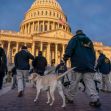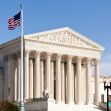President-elect Joe Biden’s inauguration takes place on January 20, 2021. All federal prisons in the U.S., more than 120, have been put on lockdown as of midnight on Saturday, January 16, in response to “current events,” according to a statement by the Bureau of Prisons (BOP). The BOP says this was a precautionary measure, rather than a response to a specific event.
To avoid backlash from inmates, no announcement was made regarding the lockdown until after they were locked in their cells Friday night. They were issued letters informing them of the lockdown, said Keri Blakinger of the Marshall Project.
In a lockdown, prisoners are restricted from leaving their cells, and visitors are prohibited. They will be allowed to shower in small groups and will still be allowed to help prepare food and perform basic maintenance. Inmates will be given limited access to email and telephones so they can stay in touch with family. “The BOP is on record regarding how important family visitation is for adjustment as well as a person’s mental health,” said Jack Donson, former Correctional Treatment Specialist at BOP. Inmates are under mental stress as a result of institutional living, and lockdowns add to that stress. Family visits are important safety valves.
Social visits only resumed in October, due to the coronavirus, but because of the surge in COVID-19 cases, many prisons have already instituted significant restrictions on visitors again. The BOP hopes to end the lockdown soon.
The BOP is under pressure from staffing shortages, which also impacts the well-being of the prisoners. A report from the Office of the Inspector General on the BOP’s overtime in 2019 said, “A safe and secure correctional setting requires a minimum staff count, meaning BOP has limited flexibility when it comes to staffing levels and assignments. Therefore, a staffing shortage at a BOP facility presents a significant challenge. The BOP uses staff overtime as a mechanism to supplement staffing.”
Overtime will no doubt increase as a result of COVID-19, with absent workers being supplemented with overtime by healthy workers. Donson said, “Lockdowns impact prisons more than one realizes. Aside from the termination of visitation, extended isolation and programs interruption, it taxes the resources of both staff and inmates, especially those in minimum security camps who need to perform work details inside adjacent higher security facilities.”
Despite the apparent staffing shortage, the BOP is prepared to deploy its Special Operations Response Teams to D.C. to support U.S. Marshals during the inauguration. Earlier this month, about 100 officers were sent to Justice Department headquarters and were deputized by the U.S. Marshals Service. They were given special legal powers to “enforce federal criminal statutes and protect federal property and personnel,” said spokesman Justin Long.
Federal, state, and local law enforcement agencies are preparing for the possibility of more violence after the events of January 6. The FBI has received information indicating that “armed protests” are being planned at all 50 state capitols and the Capitol in Washington, D.C.
President of the Council of Prison Locals, Shane Fausey, said, “In consultation with the Council of Prison Locals, and out of an abundance of precaution, I can only applaud the leadership of the Federal Bureau of Prisons for initiating this national lockdown.”
One of the last nationwide lockdowns took place in April to combat the spread of the pandemic. As of Wednesday, January 13, 2021, there were 4,718 federal inmates and 2,049 BOP staff members with COVID-19. Since the first reported case in March, 190 federal inmates and 3 staff members have died.
The most recent national lockdown of BOP facilities was in June 2020 when protests broke out as a result of the Minneapolis death of George Floyd.






